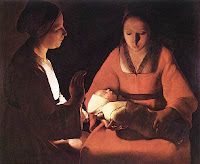One of us

Christmas has not always been celebrated by the Church. For the first few centuries, the most important holy day was Easter. The crucifixion and resurrection of Jesus Christ were the central events of salvation. The birth of Jesus was of little concern. Perhaps this is because only two of the Gospels even make mention of it. John and Mark take Jesus’ existence for granted. No need to talk about someone’s birth when it is self-evident that they must have been born. Of course, to some in the early Christian movement, it was not self-evident that Jesus was born. For some who believed that Jesus only appeared to be human, Jesus’ physical birth was a non-issue because it never happened. For some who believed that Jesus became the Son of God only when he was adopted by God at his baptism, his physical birth was like everyone else’s. No big story there. It isn’t until around the second century that we find records of any celebration of the birth of Jesus, and these assign it to Janua






